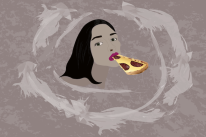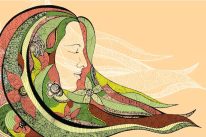
“Today I want you to think about all that you are instead of all that you are not.” ~Unknown
When I was nineteen, something happened to me that felt like a death. I had spent a lot of my teenage years feeling lonely and invisible, desperate for someone to break through to me and convince me of my own value. And then finally, I developed a crush on someone that was reciprocated. He liked me back!
I walked around all day beaming and giggling, consumed by thoughts of him and how he made me feel beautiful. Every time he sent me a text message, inquiring about me, initiating hanging out, merely displaying some interest in me, I felt like I had won the lottery.
You probably already know the latter half of this story—not only was my euphoria short-lived, but it also ended in tragedy. By the third time we hung out, he had convinced me to “come over,” took swift advantage of me, and that was that.
He made it obvious that he was interested in other women, and I was simply an addition to his count. He had no reason to invest in me further; he didn’t care about me as a person, and he never had.
I left his bedroom feeling numb and like a piece of trash. I was angry at him, but more so at myself, for foolishly believing that the superficial attention he gave me rendered me loveable, that it could reverse years of my feeling worthless. It was all so pathetic.
I deeply believed, and still believe, that my anger, shame, and sadness over this experience were more than warranted and deserved ample space to unfold. However, the trauma haunted me for years, even as I moved on to other noteworthy life experiences.
I couldn’t soften the weight and impact of how it felt to be used by him, and as a result, the whole incident played an unintentionally large role in how I viewed myself and how I engaged with other people.
I thought about the incident, and thought about it and thought about it, in some capacity, every single day, and despite all this thinking, nothing about it ever changed.
There was just this painful voice that replayed the scene with added commentary, taunting me, “Remember how you thought he liked you? Remember how stupid you acted? Remember… remember… remember…. how it all felt?”
I knew that by allowing my brain to dwell so much in this difficult space, I was giving the trauma way more of my life than it deserved. But I would have argued this was involuntary; I couldn’t control my brain from returning, over and over again, to how badly he had treated me and how bad it felt.
It wasn’t until many years later, when I discovered Buddhist philosophy and started incorporating teachings and practice into my daily life, that I realized, maybe I could be in control. Through my personal study, I was able to bring about some powerful shifts in perspective that helped me wake up to who I really was—the complex, nuanced, interesting person who could not be reduced to one unfortunate incident.
The first shift I had: my terrible experience is one part of me, and I needed to shrink it to exactly that—one part.
I am many things apart from a naïve college girl desperate for love: an accomplished student, a good friend, an athlete, a writer—I can really be anything that I want to expend effort on and draw attention to.
That girl leaving the bedroom was shocked, embarrassed, and sad. She needed a lot of care, so I had been busy protecting her. But I needed to resize her to a more accurate scale of my life.
Because, in fiercely protecting her, I was neglecting the innumerable other aspects of my identity. Now was the time to gently retreat my attention from her and take tangible action to let the other parts of me flourish.
For example, I could devote more headspace to my writing practice and work on becoming a better writer. I could check in on a loved one, listen to them carefully and compassionately, and become a better friend. With such actions, these aspects of my identity would grow more prominent in the story of my life.
With such actions, the incident could remain an incident and not speak for my whole existence.
There were so many potential versions of me, and these did not all have to be at the mercy of my trauma. It was time to get excited about future me and who I wanted her to be.
Which brought me to another big shift: if I can be whoever I want, including someone who isn’t controlled by my trauma, maybe there isn’t even one “reality.” I was clinging obsessively to my narrative of this incident and how bad it made me feel. I kept going over the injustice, over and over, as if I were trying to crack a code. The more I summoned the hard feelings, the more I convinced myself that they were true.
But what if the truth was that I’m not the summation of the terrible feelings I had? That he didn’t have so much sway in my life? If I made the conscious choice to believe these more liberating statements into existence, maybe they could become my new truth.
Believing him and believing my low self-esteem made my reality ugly. Believing that this incident was simply an incident in the grand scheme of the cosmos made my reality limitless.
All that being said, I wasn’t going to ignore the naïve nineteen-year-old me or pretend she didn’t exist. She was here to stay, and she was here for a reason.
I could look at her with tenderness and passion and make sure that I didn’t get taken advantage of like that again. I could always give her compassion. But rather than let her infiltrate my whole existence, I was going to designate a clear space for her, and always remember where she was.
She would always have somewhere to live, but I wasn’t stuck there with her. There were other places where I could go, other realities I could inhabit.
About Mallika Iyer
Mallika Iyer is a teacher, researcher, and mental health advocate in Boston. She is passionate about making learning and healing accessible for youth of all abilities. A recipient of the Fulbright fellowship, Mallika is currently a student in the Nalanda Institute’s Contemplative Psychotherapy program and enjoys traveling, writing, and getting outside in her free time.













 Though I run this site, it is not mine. It's ours. It's not about me. It's about us. Your stories and your wisdom are just as meaningful as mine.
Though I run this site, it is not mine. It's ours. It's not about me. It's about us. Your stories and your wisdom are just as meaningful as mine. 